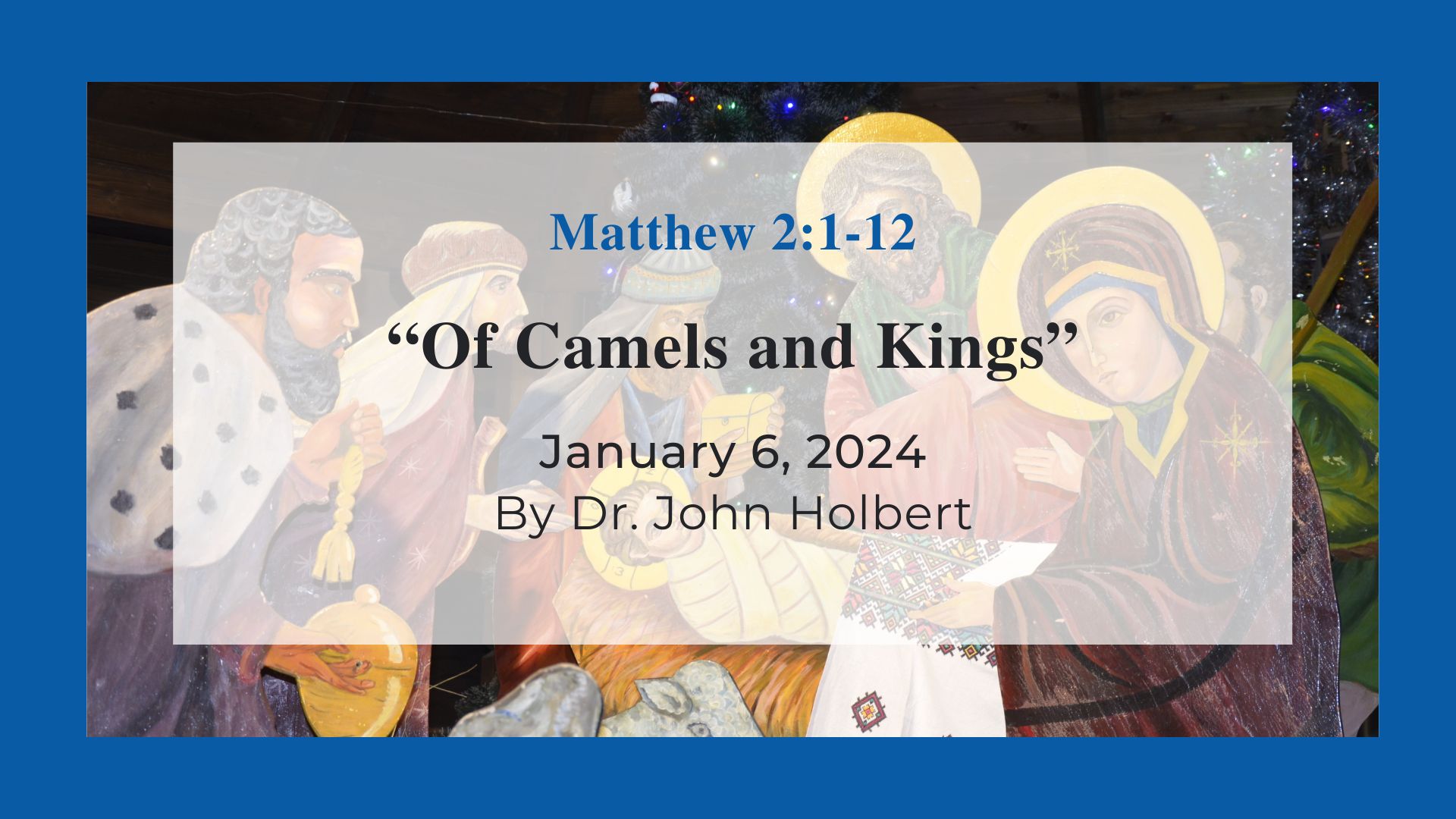Of Camels and Kings - Reflections on Matthew 2:1-12, Epiphany, Year C
by John Holbert on Wednesday, December 4, 2024

The preacher hardly needs to inquire of the church musician which hymn will be sung at the beginning of a service of Epiphany. It will without question be that ubiquitous 1857, John H Hopkins, Jr, gem, “We Three Kings.” Hopkins wrote both words and music, and he famously gave the tune its almost camel-like sway, the 3/8 meter calling forth the rhythmic movement of the Magi as they moved toward Bethlehem to worship the new-born child. Of course, Hopkins was not averse to compounding the common literary mistakes of those who actually read the text of Mt.2:1-12.
There are no camel-riding kings in this text, but there is the sly Herod, king of the Roman province of Judea. And no number of Magi is given; the traditional “three” is probably derived from Is.60, the Hebrew Bible passage assigned for the day (you may read my comments on that text on this same website). Ps.72:10 also mention “kings of Seba and Sheba bringing gifts to the coronation of the king of Israel. “Kings” are indeed mentioned in Isaiah, and they do bring gifts to the restored Jerusalem, though the gifts are two—gold and frankincense— not three. However, as I noted in that earlier essay I mentioned, myrrh is often to be found paired with frankincense in other biblical passages, and so Matthew includes it among the Magi’s gifts to the Christ child. Indeed there are camels aplenty in Isaiah, too, a “vast number,” he says, from Midian (a famous place of camels), Ephah, and Sheba. Matthew does not tell us the Magi’s means of conveyance, but long journeys in the ancient east are invariably done on camels. Having briefly ridden a camel or two in my time, I am amazed that anyone could ride the beast for many more than 10 minutes! But the camel, domesticated around 1000BCE, was a fabulous creature, able to go up to seven days without water, thus making heretofore long desert treks far more possible.
But back to the hymn. “We three kings of Orient are,” Hopkins begins, nicely offering to us the generic “orient” as the origin place of the Magi, thus avoiding the huge scholarly speculations about where they in fact came from. “Magi” is probably a reference to a caste of Persian priests with special skill in dream interpretation. There are in Matthew astrologers/ astronomers who examined star movements as signs of earthly events. Magi is Persian, astrology has roots in Babylon, and the gifts find their origins in Arabia or Syria. Hopkins’s hymn speaks of their long travels: “field and fountain, moor and mountain,” all “following yonder star.” It is difficult to imagine a “moor” in the deserts between Persia and Bethlehem, but the Pittsburgh-born clergyman, who served parishes in upstate New York, surely knew what a moor looked like.
The rest of the hymn riffs on the implications of the three gifts of the Magi. “Gold I bring to crown him again, king forever, ceasing never, over us all to reign.” Gold is connected to royalty, and Hopkins makes the connection clear. “Frankincense to offer have I; incense owns a diety nigh” (i.e. when one smells such a fragrance, God cannot be far away). Incense is naturally connected to worship, and the fact that Hopkins was an Episcopal clergyman, incense must regularly have accompanied his experiences of worship. “Myrrh is mine; its bitter perfume breathes a life of gathering gloom.” Myrrh was often used at funerals as a spice to embalm the body; Jesus, of course, will die at the hands of a Roman executioner, and Hopkins employs the gift of myrrh as a precient object of that death.
Matthew in his usual fashion mines the Hebrew text for “prophecies and predictions” of the life of Jesus Messiah. Jesus, as a “Son of David,” (see Mt.1:6 and the long and careful Matthean genealogy) is born in Bethlehem, David’s birth city. The “eastern star, “seen by the Magi “at its rising” is a reference to Numbers 24:17 (“a star shall come forth out of Jacob”) and decidedly not to any supposed astral phenomena like supernovas, comets, or planetary conjunctions as have been surmised over the ages. In Mt.2:5 we find a compounded quotation from Micah 5:1-2 and 2 Samuel 5:2, indicating Jesus’ origin in Bethlehem and his future role as shepherd of the people.
Matthew weaves his own unique literary tale of Jesus’s birth, focusing far less on the birth itself, stating nothing of Luke’s world-wide census or manger, and omitting those famous angels, but saying Jesus and family lived in a Bethlehem house and received that fabulous visit from the wondrous Magi, foreigners and Gentiles, who learned of the birth and were compelled to come and worship. Though our modern children’s Christmas pageants mix camels and stars and shepherds and Magi, Luke and Matthew go their own respective ways to give us the special gift of their literary art. Conservative Christians are fond of saying, “Wise men still seek him,” and according to Matthew they did and do. How glad we are to celebrate on this 12th day of Christmas the delightful visit of the Magi to the house in Bethlehem!
